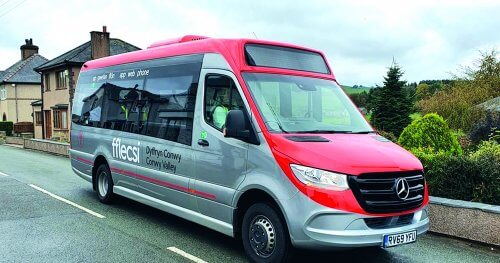
The Welsh Government has released its plan for the future of public transport
Welsh Ministers have set out in a new document the country’s plans for its transport systems as it looks beyond the pandemic. “This is something that we have to do. The climate emergency is one of the biggest defining issues of our time. If we are going to protect the lives of our children, we need to achieve net zero by 2050,” say Ken Skates MS, Minister for Economy, Transport and North Wales, and Lee Waters MS, Deputy Minister for Economy and Transport, in their introduction to Llwybr Newydd – or ‘new path’ in English.
“We need to change the way we travel. We need fewer cars on our roads, and more people using public transport, walking or cycling. But we won’t achieve that level of change unless we take people with us, listening to users and involving people in designing a transport system that works for everyone. Our transport system is one of the most important national assets we have. We need an accessible, sustainable and efficient transport system.
“Llwybr Newydd is the beginning of a journey – not an end. It sets a long-term direction and three urgent and immediate priorities. It shows where we want to go – and how we will get there.”
The strategy sets out a vision for an accessible, sustainable and efficient transport system with better physical and digital connectivity, more local services, more home and remote working and more active travel, to reduce the need for people to use their cars on a daily basis, and pledges to provide reliable, efficient, effective and affordable transport services that people want to use, can and do use.
It highlights what it calls the Sustainable Transport Hierarchy, with walking and cycling at the top of the inverted triangle, followed by public transport, eco-friendly private transport, and other private vehicles at the bottom.
Five keys
Involvement, integration, prevention, collaboration, and long-term are the five key words which form the basis for the actions set out within the plan. Looking at bus use, the strategy sets out a vision of a stable and coherent network of bus services that are fully integrated with other modes of public transport, reliable, affordable, flexible, easy to use, low-carbon and encourage more people to use the bus.
The Welsh Government said that over the next five years it will:
- Support quality, affordable, regular, reliable and punctual bus services in partnership with local authorities, the commercial and third sectors;
- Address congestion hotspots and invest in bus stations and stops to speed up journeys and improve passenger experiences;
- Extend the reach of bus services
- Set standards so passengers know what they can expect from bus services;
- Work with partners to ensure that services and infrastructure are physically accessible to wheelchair users;
- Continue to improve bus services for education;
- Ensure roll-out of contactless payment as well as other technology, screens and measures required to maintain public health in the wake of Covid-19; and
- Manage post-Covid-19 adaptations to bus services to reflect the changing needs of the travelling public.
Priorities for bus services outlined in Llwybr Newydd include:
- Delivering more flexible bus services, in partnership with local authorities, the commercial and third sectors;
- Rolling out the technology and infrastructure to deliver ultra-low emission buses;
- Progressing new bus legislation that gives the public sector more control over local bus services;
- Improving working conditions and attractiveness of the industry to bus drivers;
- Ensuring there is training in place to ensure that drivers make everybody feel welcome and safe, and keep that training up to date;
- Supporting the Traffic Commissioner in implementing an effective enforcement regime that helps to improve reliability and journey times;
- Preparing Welsh language standards for those who provide bus services in Wales; and
- Working with bus providers to help deliver these priorities and to attract bus group company investment in their Welsh services, with longer-term funding horizons.
’Third Sector’
Llwybr Newydd’s vision for the community transport sector envisages a ‘thriving, viable third sector’ which meets the needs of local communities and delivers wider social, economic, environmental and cultural benefits.
Over the next five years the Welsh Government has set out its plans to:
- Ensure that community transport provision is included in travel plans for existing and new transport, health and education services;
- Support existing operators and grow the range of services, responding to community needs;
- Grow services that are an alternative to private car ownership such as car clubs;
- Better integrate third sector services into wider transport policy, planning and provision;
- Introduce Memorandum of Understanding between the Welsh Government, TfW and the third sector;
- Work with the Traffic Commissioner to ensure that regulation supports volunteer drivers and community operations;
- Incorporate information about community and third sector transport services into transport apps and journey planning initiatives;
- Provide peer-mentoring, support and training for volunteers; and
- Better understand the scope, issues and contribution of the third sector and explore the idea of a minimum level of lifeline journey provision in looking at future targets.

